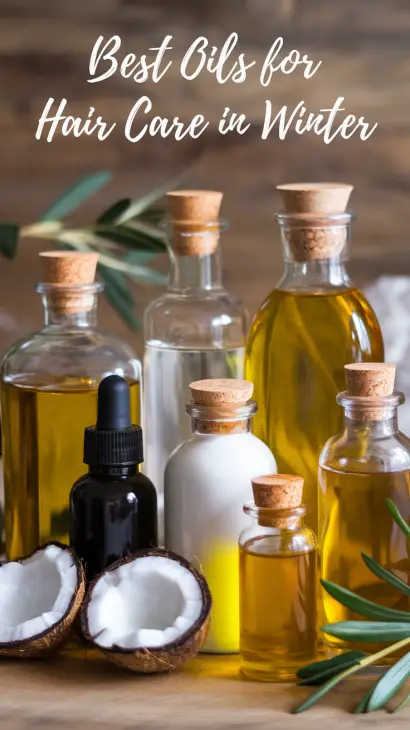Best Oils for Hair Care in Winter
Winter can be tough on hair, leaving it dry, brittle, and prone to damage. Incorporating the right oils into your hair care routine can work wonders, keeping your locks soft, hydrated, and resilient throughout the season.
Why Hair Suffers in Winter
Cold temperatures and low humidity rob your hair of natural moisture, causing common problems:
| Winter Effect | Impact on Hair |
|---|---|
| Dryness | Causes rough, unmanageable hair. |
| Breakage | Makes hair brittle and prone to splitting. |
| Frizz | Static electricity leads to flyaways. |
| Flaky Scalp | Can result in dandruff and irritation. |
Addressing these issues with the right oils helps restore moisture and vitality.

Best Oils for Winter Hair Care
Certain oils are especially effective at combating winter-related hair concerns:
| Oil | Best For | Benefits |
|---|---|---|
| Coconut Oil | Dry and damaged hair | Deep hydration and reduced protein loss. |
| Argan Oil | Frizz and color-treated hair | Adds shine and softens hair. |
| Jojoba Oil | Lightweight hydration | Balances scalp oil production. |
| Olive Oil | Curly or coarse hair | Improves elasticity and reduces dryness. |
| Castor Oil | Scalp health | Promotes hair growth and soothes irritation. |
 How to Use These Oils Effectively
How to Use These Oils Effectively
- Warm the oil slightly for better penetration.
- Massage into the scalp for improved circulation.
- Apply evenly through the hair, focusing on the ends.
- Leave on for 30 minutes or overnight for deep conditioning.
- Wash out thoroughly with a gentle shampoo.
Oils Based on Hair Type
Tailor your choice of oil to suit your hair type:
| Hair Type | Recommended Oil | Why It Works |
|---|---|---|
| Curly Hair | Coconut or Olive Oil | Hydrates deeply and tames frizz. |
| Fine Hair | Jojoba Oil | Lightweight hydration without heaviness. |
| Color-Treated Hair | Argan Oil | Protects color and enhances shine. |
| Oily Scalp | Tea Tree Oil (diluted) | Balances sebum production and prevents buildup. |
DIY Oil Blends for Winter Hair Care
1. Deep Hydration Mask
- Ingredients:
- 2 tbsp coconut oil
- 1 tbsp argan oil
- 5 drops lavender essential oil
- Instructions:
Mix ingredients and apply to damp hair. Leave on for 1 hour, then rinse.
2. Scalp Soothing Serum
- Ingredients:
- 1 tbsp castor oil
- 1 tbsp jojoba oil
- 3 drops tea tree oil
- Instructions:
Massage into the scalp and leave overnight before washing out.

Seasonal Hair Care Tips
- Protective Styling: Use braids or buns to shield your hair.
- Silk Accessories: Prevent friction and static with silk scarves or pillowcases.
- Avoid Overwashing: Limit washing to retain natural oils.
- Use a Humidifier: Keep indoor air moist to prevent dryness.
Frequently Asked Questions
1. Can I mix different oils for treatments?
Yes, blending oils like coconut and argan offers multiple benefits.
2. How often should I oil my hair in winter?
Oiling 1–2 times a week is typically sufficient.
3. Are oils suitable for oily hair?
Yes, lightweight oils like jojoba or diluted tea tree work well for oily scalps.
4. Can oiling reduce dandruff?
Yes, castor and tea tree oils can hydrate the scalp and reduce flakiness.
5. Should I warm the oil before applying?
Warming enhances absorption but isn’t mandatory.
6. How do I avoid greasy residue?
Use a sulfate-free shampoo to remove excess oil effectively.
With the right oils tailored to your hair type, winter hair care becomes much simpler. Start with coconut or argan oil for hydration, or experiment with DIY blends to discover what works best for you. Combined with protective practices, these oils can keep your hair healthy, soft, and manageable even in the coldest months.
